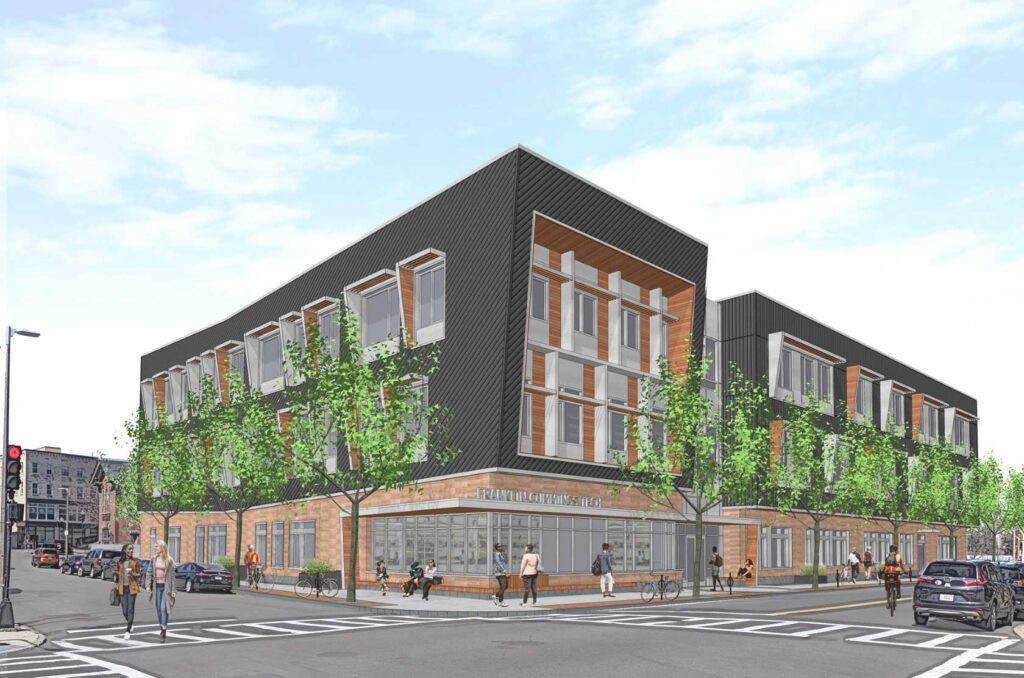
In Nubian Square, the site of the new campus of Benjamin Franklin Cummings Institute of Technology has been cleared, with the foundation soon to be laid. Across Eustis Street lies the Blair parking lot, where an office building is to rise, providing lab and classroom space for the college’s biotechnology students.
That is, if the Massachusetts Legislature approves $50 million to support training Franklin Cummings Tech students, most of them of color, and other college students and adult workers, to enter the major growth industry locally.
“We’re looking forward to having our own lab, designed to our specs,” said Aisha Francis, president and CEO of the two-year college. “It’s literally across the street.”
But the Legislature ended its formal lawmaking session the morning of Aug. 1 without considering a $3 billion economic development bill. The House version includes the partial funding for the life sciences training center in Nubian Square, while the Senate version does not. The clock ran out, even after being extended well past the midnight deadline, before negotiators from both chambers could work out their unspecified differences.
At first, it looked like the bill would have to wait until next year and start going through the approval process all over again. Because the legislation authorizes the state to borrow money, it requires roll call votes, which are not taken during the informal sessions scheduled the rest of this year.
Then Gov. Maura Healey the next day called for legislators to return to complete work on the economic development bill, which she originally filed in March and is designed to stimulate more growth in the life sciences and climate technology industries. Both House Speaker Ron Mariano and Senate President Karen E. Spilka have expressed a willingness to convene a special formal session for that purpose but have not said when it might be.
“I am excited about the opportunity to return back to the legislature, as soon as possible, with my colleagues to deliver on important work that was left undone,” said state Sen. Liz Miranda of Roxbury, who sponsored the $50 million amendment in the Senate. “We feel confident that there is still room to advocate for our priorities as this session comes to an end.”
State Rep. John Moran sponsored the amendment in the House with Rep. Chynah Tyler of Roxbury. He had a similar reaction to the unexpected development.
“I’ve been asked by several constituents to make every effort to finish the work on the economic development bill,” Moran said. “I fully support the legislature returning and have heard the same from my colleagues. I’m encouraged by the possibility of a special session when the conference committee comes to an agreement.”
The six negotiators on the conference committee meet in private and keep their deliberations secret, even from fellow lawmakers with an interest in the outcome.
“I’m not sure what held up the economic development bill,” Moran said.
Miranda suggested conferees differed on policy proposals, rather than the bond authorization, but conceded, “I don’t necessarily know what the differences were.”
Both lawmakers indicated that funneling more workers of color into the life sciences is a matter of economic equity.
“Our district deserves to be part of that,” Miranda said. “We have one of the poorest districts in the commonwealth and one of the Blackest.”
Moran, who spent four years working in the life sciences, said, “It makes sense, if it’s a major industry, we need to bring in Black and brown trained [workers].”
Francis of Franklin Cummings Tech said entering the industry would allow trainees to “earn enough to thrive in their own communities.”
Richard Taylor, lead developer of the life sciences center, said the delay represents a temporary setback for the project and a threat to Massachusetts losing its lead in the industry.
“It means I got to keep treading water,” Taylor said. “They’re playing with fire. North Carolina and other states are rapidly catching up.”
It’s unclear when the legislature will be called back into formal session. This is an election year for its 200 members, with party primaries scheduled Sept. 3.
“I’m pushing to get this done soon,” Miranda said.
Taylor speculated, “I think they’re going back in the fall.”
Last year, Franklin Cummings Tech, currently located on Berkeley Street in the South End, received approval from the state Board of Higher Education to offer an associate degree in biotechnology. The first class of students arrives in September. Francis said the new campus in Nubian Square will be ready next year.
While the legislature works out its contribution to the life sciences center and the office building is under construction, the biotech students will do their lab work in temporary quarters at Emmanuel College in the Fenway, Francis said.
Plans for the more convenient space across the street, Francis said, include three labs with “wet science areas with sinks” where chemicals can be used, and “bench space for classrooms.” They would take up one floor of the office building, about 20,000 square feet, according to the plans.
“Our model is to be very integrated into the community,” Francis said, “showcasing assets in the community.”






